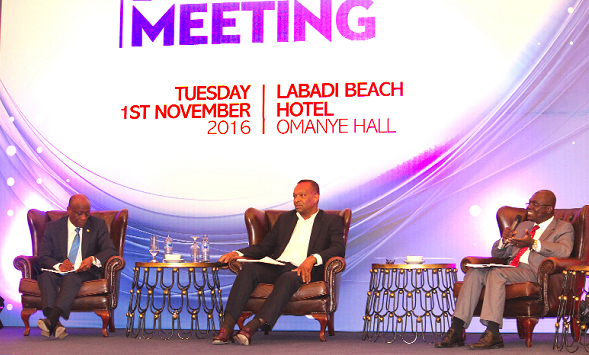
‘Don’t embark on unbudgeted projects’
The third in the series of this year’s quarterly Graphic Business/Stanbic Bank Breakfast Meeting came off successfully in Accra with the call on the government not to embark on development projects that had not been budgeted for in election years.
The Director of the Institute of Statistical, Social and Economic Research (ISSER), Professor Felix Asante, noted that the country had always experienced budget deficits during election years as a result of the pressure from electorate for projects in their areas and the pleasure of the government to please and woo potential voters.
The breakfast meeting, which was on the theme; “Election Year Budget: Implications for Macro-economic Stability,” brought together business leaders, industry captains, researchers, journalists and the academia to discuss the policy implications of running a deficit in the political life cycle.
Professor Asante said while the electorate agitated for projects in election years, government also engaged in high spending in order to win more votes.
“The electorate must move away from punishing governments with the inauguration of projects in elections years. This attitude of only seeing development in election years is what this country must move away from,” he said.
He suggested the need for the government to spread the implementation of development projects over its full term, instead of waiting until the last few months to the end of its tenure before embarking on or inaugurating projects, adding that election projects were hurting the country very much.
Not government fault
The Minister of Finance, Mr Seth Terkper, responded that the budget overruns have not always been caused by government spending.
He noted that every deficit experienced by the country, particularly in election years had been attributed to high government spending without giving the government the benefit of the doubt.
Mr Terkper explained that although the pattern over the years had shown an increase in budget deficits during election years, other factors such as external shocks (for instance, the fall in commodity prices), had accounted for some of the overruns.
Perennial deficits
The Managing Directors (MDs) of the Graphic Communications Group Ltd, Mr Kenneth Edem Ashigbey and Stanbic Bank Ghana, Mr Alhassan Andani, also called for a concerted effort to find solutions to the country's perennial election year deficits so as to give confidence to the investor community in the economy.
Mr Andani revealed that those in the financial services sector who interacted with the domestic investors and external investors understood first-hand the real cost of elections, saying since January, most of Stanbic Bank's conversations with external investors had been on how the December 7 election would turn out, where they had to assure them that nothing would happen.
"For example, we should be mindful of the way government would run to ensure that everything we do in an election year is within our normal frame of running our economy. It should have very little bearing with the civil democratic choices we make," Mr Andani stressed.
For his part, Mr Ashigbey chronicled how since 1992 the economy had slipped into gaping deficits every four to eight years when there were national elections.
He said the fiscal indiscipline, which cuts across the ruling parties, the National Democratic Congress (NDC) and the New Patriotic Party (NPP), required leaders at all levels to come out with pragmatic solutions to end it perpetually.